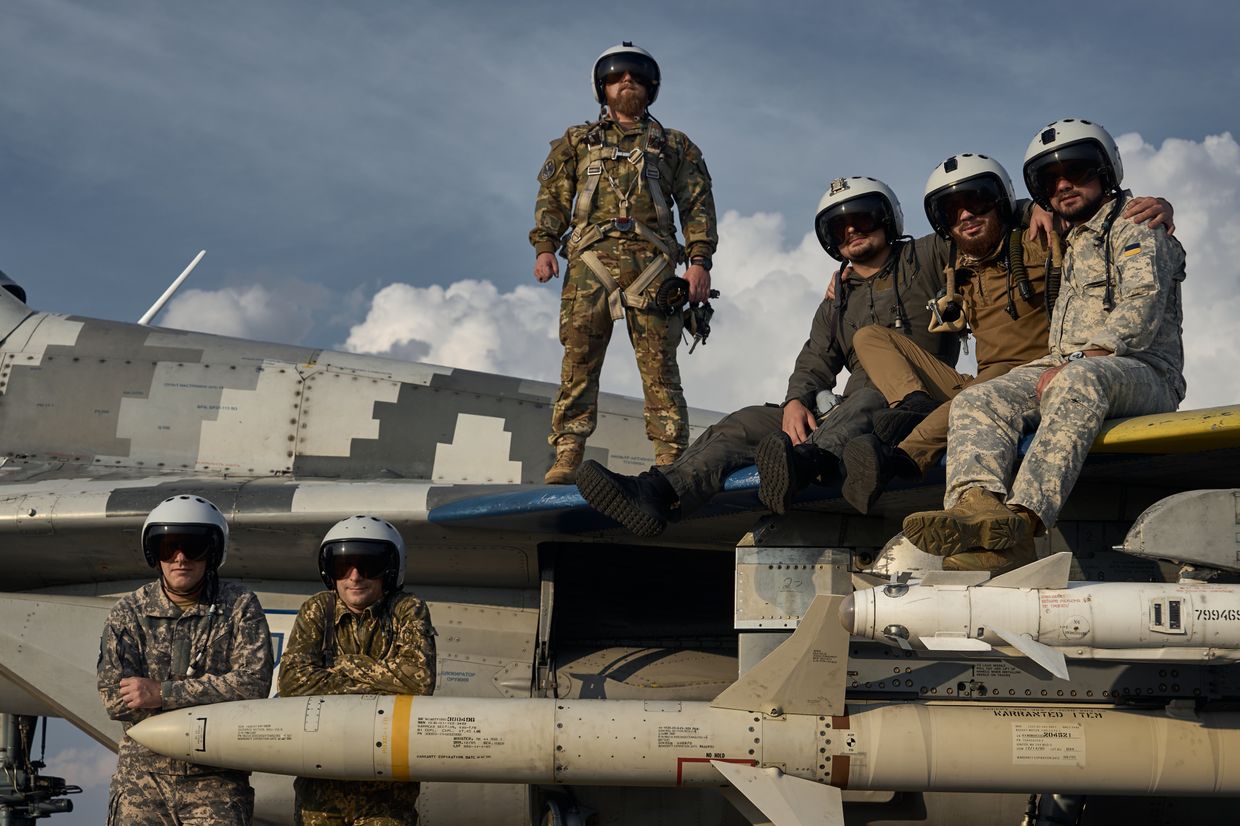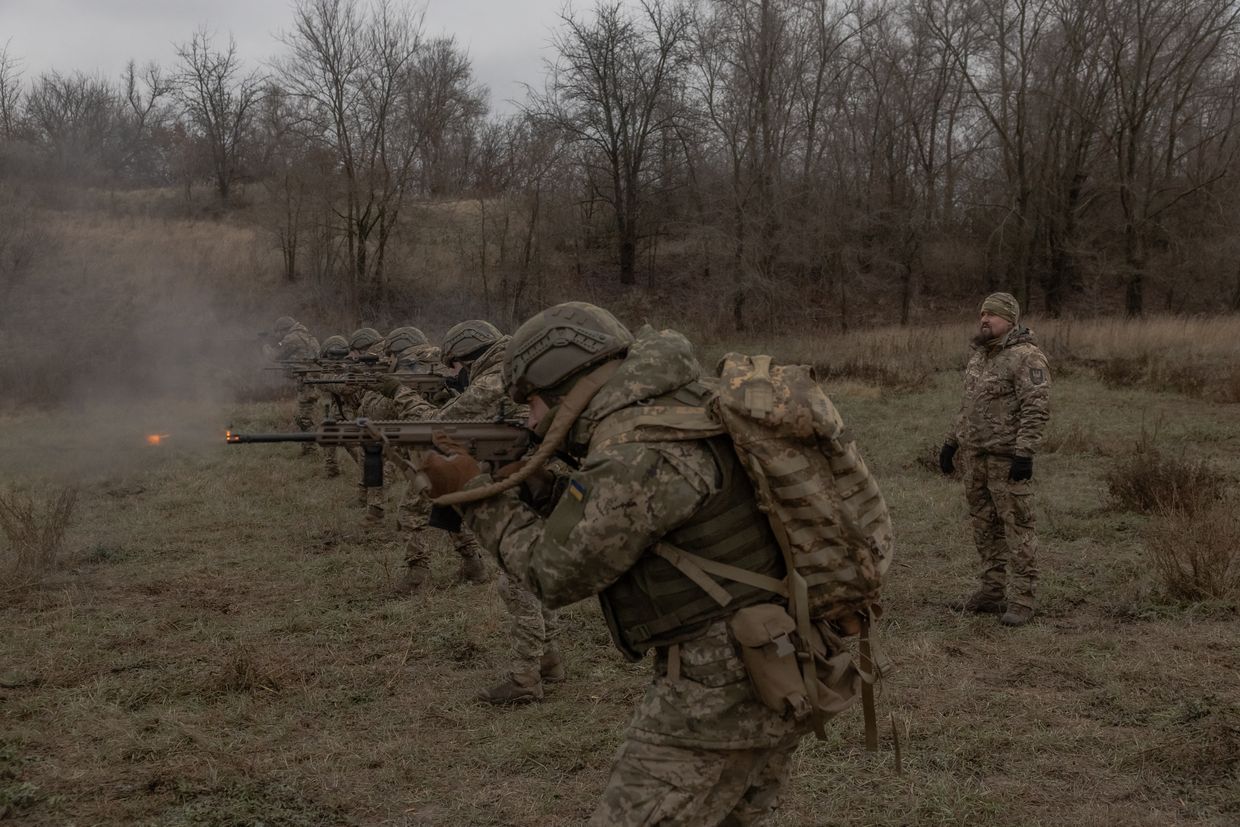Ukraine war latest: 'We'll swap one territory for another' — Zelensky on trade territory in potential peace talks with Russia

Key developments on Feb. 11:
- Ukraine could trade territory in potential peace talks with Russia, Zelensky says
- Ukraine strikes Russia's Saratov oil refinery, military confirms
- US won't send troops to Ukraine, Pentagon chief says
- North Korea has sent 200 long-range artillery guns to Russia, Seoul says
- Ukrainian drones destroy Russian Smerch-2 rocket launcher in Donetsk Oblast
President Volodymyr Zelensky said he planned to exchange territories if U.S. President Donald Trump succeeds in bringing Ukraine and Russia to the negotiating table, according to an interview with The Guardian published on Feb. 11.
Ukraine launched a surprise cross-border incursion into Russia's Kursk Oblast in August 2024, initially capturing around 1,300 square kilometers (500 square miles) of territory. While Ukrainian forces have since lost roughly half that area, they recently advanced 2.5 kilometers (1.5 miles) in the region in a new offensive.
The Ukrainian military continues to hold Russian territory that could play "an important part" in future negotiations, Zelensky previously said.
"We will swap one territory for another," Zelensky told The Guardian, without specifying which Russian-occupied land Ukraine would seek in return.
"I don't know, we will see. But all our territories are important, there is no priority," he said.
Talk of ending Russia's full-scale invasion of Ukraine has increased as U.S. President-elect Donald Trump took office on Jan. 20.
The new administration aims to end Russia's war against Ukraine 100 days from inauguration, Keith Kellogg, Trump's special Ukraine peace envoy, said on Jan. 8.
According to sources in Ukraine's President's Office, cited by RBC-Ukraine, Kellogg will visit Ukraine on Feb. 20 after the Munich Security Conference.
On Feb. 7, the U.S. president revealed he aims to meet Zelensky in Washington the following week. He also recently said that the U.S. wants access to Ukraine's rare earth minerals in exchange for aid. Zelensky has responded that Kyiv is open to mining deals with partners.
Trump has also allegedly spoken with Russian President Vladimir Putin about ending the war. The U.S. president told the New York Post he had a concrete plan to end the war, adding, "I hope it's fast. Every day, people are dying. This war is so bad in Ukraine. I want to end this damn thing."
Ukraine strikes Russia's Saratov oil refinery, military confirms
Ukrainian forces struck Russia's Saratov oil refinery in a strike overnight on Feb. 11, the General Staff of Ukraine's Armed Forces said after reports of drone attacks in the region.
Unverified videos posted to social media showed a large fire and search lights raking the sky reportedly in the vicinity of the refinery.
"The refinery mainly produces gasoline, fuel oil, and diesel fuel. In total, more than 20 types of oil products (are being produced there)," the General Staff said, adding that the facility supplies Russian occupation forces in Ukraine.
The Ukrainian military reported a confirmed hit and a fire at the Rosneft facility. The full extent of damage is being determined, it added.
The attack was carried out jointly by the Unmanned Systems Forces, the military intelligence agency (HUR), and the Special Operations Forces, as well as other units, according to the statement.
The confirmation of the attack on the Saratov oil refinery came after earlier reports of a drone attack against the oil refinery lying some 1,500 kilometers (930 miles) from Ukraine's border.
The Russian Telegram news channel Shot also reported at least 11 explosions over Engels, a city lying across the Volga River from Saratov.
The Russian strategic aviation airbase Engels-2, which has been repeatedly targeted by Ukrainian long-range strikes, lies in the vicinity.
US won't send troops to Ukraine, Pentagon chief says
The U.S. plans to review the deployment of its troops around the world but is not going to send them to Ukraine, U.S. Defense Secretary Pete Hegseth said during a press conference on Feb. 11.
Hegseth's remarks come amid ongoing discussions among Western countries about the possible deployment of peacekeeping forces if a ceasefire is negotiated.
"We are not sending U.S. troops to Ukraine," Hegseth told reporters in Stuttgart, Germany, during his visit to U.S. European Command and U.S. Africa Command headquarters.
Hegseth added that Washington currently has no plans to reduce the U.S. contingent abroad but will review its deployment by President Donald Trump's strategic vision.
The U.S. Defense Secretary also expressed hope for a swift peace agreement in Ukraine, which Trump has pledged to conclude.
"With hopefully a rapid peace deal in Ukraine, which the President (Donald Trump) is committed to delivering, we can then review force posture and encourage as you're going to see tomorrow (on Feb. 12) ... at the Ukraine contact group and the NATO ministerial, we're going to have straight talk with our friends," Hegseth said.
Hegseth is expected to attend the Ukraine Defense Contact Group (UDCG), also known as the Ramstein summit, as part of a tour of Germany, Belgium, and Poland, according to a Pentagon statement published Feb. 7.
At the summit, the defense secretary aims to "reiterate President Trump's commitment for a diplomatic end to the war in Ukraine as quickly as possible," the statement read.
However, this time, Hegseth is not likely to announce new military aid supplies, which was a regular occurrence during the Joe Biden administration, according to the Washington Post (WP).
The Pentagon chief will not hold separate meetings with his Ukrainian counterparts but will rather be a "listener" at the Ramstein and at the meeting of NATO defense ministers on Feb. 13, an unnamed U.S. official told WP on condition of anonymity.
The transition of power in Washington and expected changes in U.S. policy on Ukraine cast doubt on the future of the Ramstein summit. In February, for the first time since the establishment of the Ramstein format, the meeting was convened by the U.K., not the U.S.
North Korea has sent 200 long-range artillery guns to Russia, Seoul says
North Korea has provided Russia with around 200 long-range artillery pieces to boost its war effort against Ukraine, the Yonhap news agency reported on Feb. 11, citing South Korea's Defense Ministry.
Seoul further warned that Pyongyang is likely preparing to send additional troops and arms to back Russia's war, confirming earlier warnings by the Ukrainian intelligence.
North Korea has reportedly also supplied ballistic missiles, millions of artillery shells, and other arms to Moscow. In addition, the country has deployed up to 12,000 troops to Russia's Kursk Oblast to support Russian forces in countering a Ukrainian cross-border incursion launched in early August 2024.
The South Korean Defense Ministry suspects that North Korea is receiving Russia's technological assistance with nuclear-powered submarines and intercontinental ballistic missiles (ICBM) in exchange for its military support, Yonhap reported.
According to the Japanese public broadcaster NHK, North Korea is also expected to begin drone production this year with Russian technical assistance.
At least 300 North Korean soldiers have been killed and another 2,700 wounded fighting in Russia's Kursk Oblast, South Korea's National Intelligence Service (NIS) claimed in mid-January.
Ukraine placed North Korean losses to as many as 4,000 killed and injured. Kyiv's military intelligence chief Kyrylo Budanov nevertheless predicted that North Korea might soon send reinforcements to Russia, namely gun and rocket artillery units.
The New York Times reported on Jan. 30 that North Korean troops had been pulled from the front, and a Special Operations Forces spokesperson confirmed to the Kyiv Independent at the time that Ukraine's special forces had not faced Pyongyang's soldiers for three weeks.
On Feb. 7, President Volodymyr Zelensky announced that North Korean soldiers were "brought in again" to Kursk Oblast, a day after Russian media claimed Ukraine had launched a new offensive in the Russian region.

Ukrainian drones destroy Russian Smerch-2 rocket launcher in Donetsk Oblast
Soldiers of the 63rd Separate Mechanized Brigade, part of the Steel Lions unit, shared footage on Feb. 11 showing a rare Russian Smerch-2 anti-submarine rocket launcher being destroyed by drones in the Lyman sector of the front line in Donetsk Oblast.
Drones have played a pivotal role for both Ukraine and Russia throughout the full-scale invasion, used extensively for reconnaissance and combat operations.
According to the brigade's statement, Russian forces had mounted a Smerch-2 anti-submarine rocket launcher on a Ural vehicle and concealed it in the forests of the Lyman sector before it was targeted and destroyed.
Ukraine has developed and deployed a wide range of aerial, naval, and ground-based drones for battlefield operations. Defense Minister Rustem Umerov said Kyiv delivered more than 200,000 domestically produced drones to front-line units in December alone.
The Smerch-2 is a Soviet-era rocket and bomb launcher designed to destroy submarines and attack torpedoes. It features a stationary installation with 12 radially arranged 213 mm caliber barrels and was adopted by the Soviet Navy in 1961.
Note from the author:
Ukraine War Latest is put together by the Kyiv Independent news desk team, who keep you informed 24 hours a day, seven days a week. If you value our work and want to ensure we have the resources to continue, join the Kyiv Independent community.














